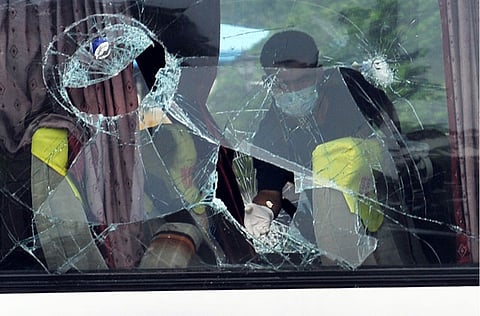Philippines defends handling of bus hostage crisis
Philippines marks national day of mourning for hostages killed in a hostage crisis in Manila, while authorities defend their handling of the crisis

Manila: Philippine President Benigno Aquino declared on Wednesday a "national day of mourning" as a sign of solidarity with Hong Kong over its eight citizens killed in a hostage crisis in Manila.
The announcement, made by presidential spokesman Edwin Lacierda, came amid widespread anger in Hong Kong over Monday's ordeal, in which an ex-policeman hijacked a busload of tourists from the southern Chinese city.
He said all government offices would fly the Philippine national flag at half mast on Wednesday, although they would remain open for business. Lacierda said Aquino also met China's envoy to Manila, Liu Jianchao, on Tuesday to brief him on the hostage crisis.
"The president reassured the Chinese officials that the Philippine government will extend all assistance to victims and relatives of victims," Lacierda said.
He said Aquino also promised the Chinese side of a speedy investigation into the incident as well as protection of its nationals visiting the Philippines.
Philippine authorities on Tuesday defended their handling of the bus hostage crisis, but missteps were seen as signs of deeper deficiencies in a country beset by security problems.
Eight hostages and their disgruntled ex-policemen kidnapper were killed at the end of a day-long siege in the capital after signs earlier that the crisis would be resolved peacefully.
Meanwhile anger mounted in Hong Kong Tuesday against Philippine authorities as flags flew at half-mast and the stock exchange held a minute's silence in mourning for eight tourists mown down in Manila.
Audio: Malak Harb reports on the bus hijack in the Philippines
Audio supplied by Radio 2
One Hong Kong survivor of Monday's day-long bus siege in the Philippine capital said her husband and two daughters aged 21 and 14 were killed as the crisis reached a bloody climax live on television.
Her 18-year-old son was in intensive care in hospital and her husband died a hero trying to shield his family, said the survivor, identifying herself only as Mrs Leung.
"The Philippine government... I can't accept this. Why did they do this to us?" she told Hong Kong officials who flew to the Manila hospital, in comments shown on Cable News TV.
"(The gunman) did not want to kill us. He only shot us after the negotiations failed," she said, sobbing.
The Hong Kong government raised a "black" travel alert for the Philippines, urging against all travel to one of Southeast Asia's most popular tourist spots.
"We demand that the Philippine authorities conduct a detailed and comprehensive investigation on the incident. They must provide a full account to us as soon as possible," Chief Executive Donald Tsang said.
Tsang also urged all Hong Kong tour groups in the Philippines to return home.
The government organised two chartered flights by Hong Kong's flag carrier Cathay Pacific to take relatives of the hostages, as well as psychologists, doctors and social workers, to Manila.
Philippine President Benigno Aquino III admitted there were deficiencies in the operation, but said the gunman's access to TV and radio made it hard for police to launch a rescue mission on a bus that was parked some distance from cover.
Long siege
The day-long siege in downtown Manila had a lengthy climax, with police launching an initial assault on the bus in heavy rain before moving in a second time and killing the gunman an hour later.
"Another aspect that I think not too many people are aware was that at some point in time, when the action did occur, the hostage taker had surrounded himself with his hostages," Aquino he told a midnight news conference.
"He used them as body shields which made our forces hesitate to employ deadly force."
Authorities had taken heart from the release during the day of nine hostages by 55-year-old Rolando Mendoza, a disgruntled ex policeman angry at being sacked from the force.
Aquino said Mendoza had not seemed to be a hard-core criminal or terrorist and "that led us to believe that this could be settled peacefully, without loss of life".
The Philippines is trying to end decades-long insurgencies by separatists and Maoist guerrillas. As well, authorities are trying to combat militants, clan wars and criminal gangs - an effort made harder by endemic corruption.
"We will be enhancing and providing funds to support the training and acquire equipment that seemed to be so lacking," said Aquino, who took office less than two months ago amid widespread expectations he could restore the Philippines' reputation.
"There was a television set inside the bus. Unfortunately, Mendoza got a glimpse of what the police were up to. So we lost our element of surprise," Interior Secretary Jesse Robredo told dwIZ radio.


